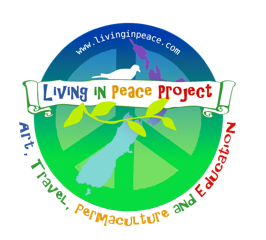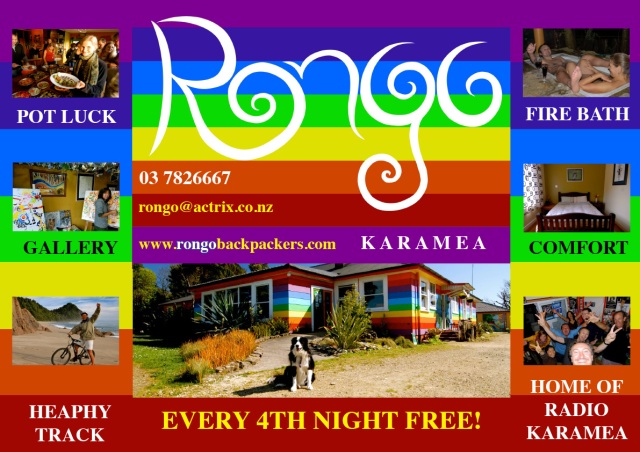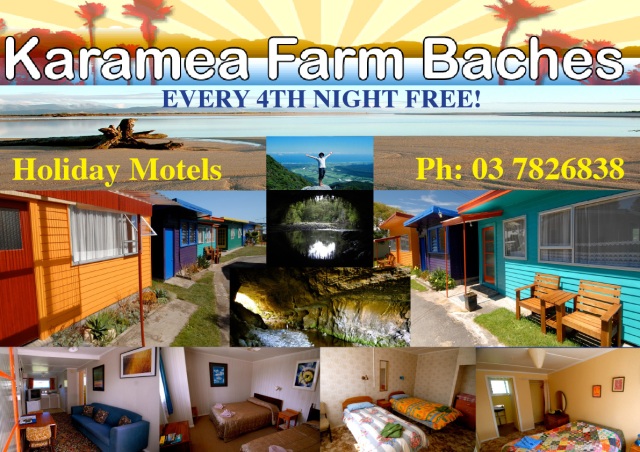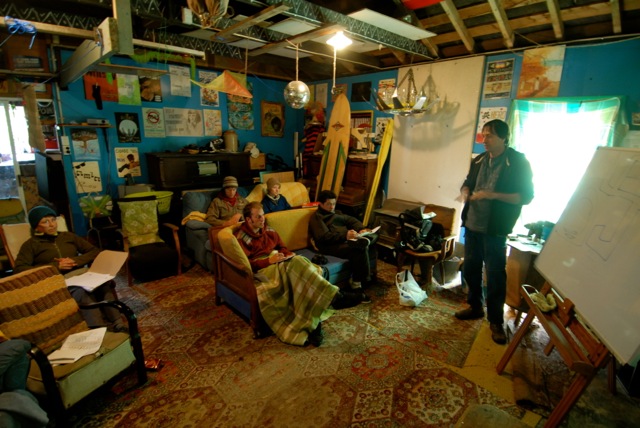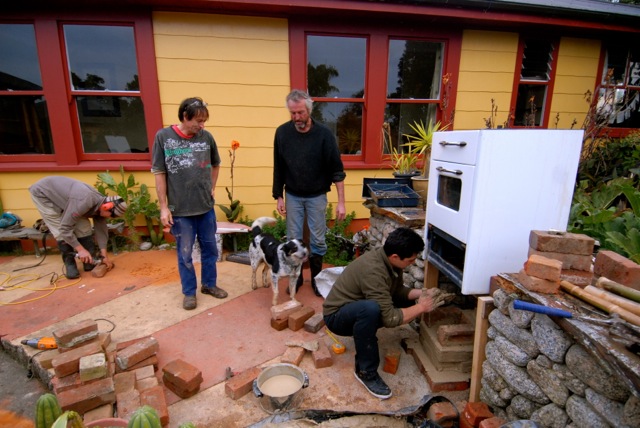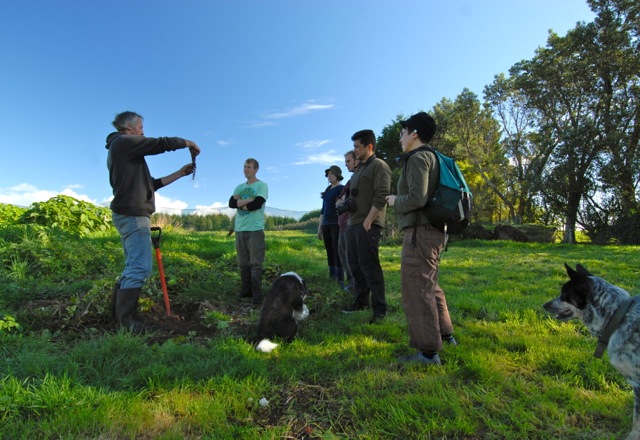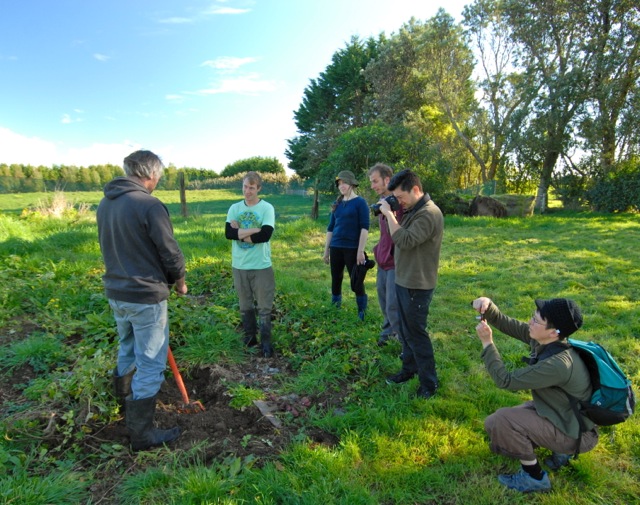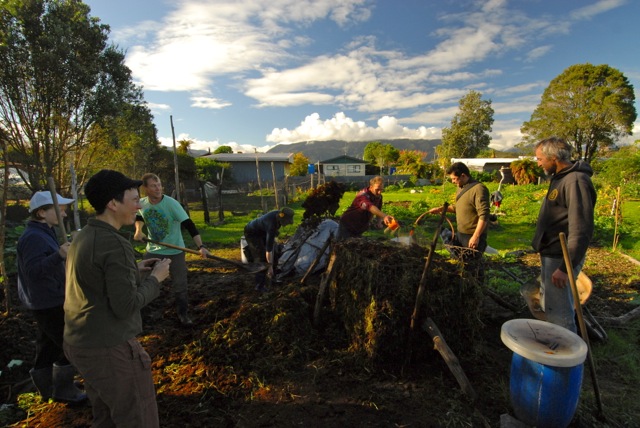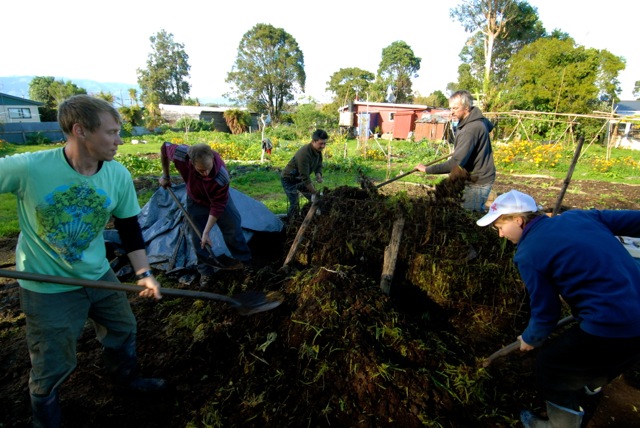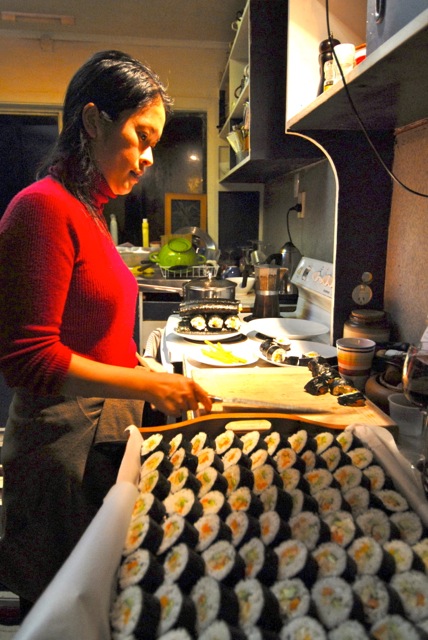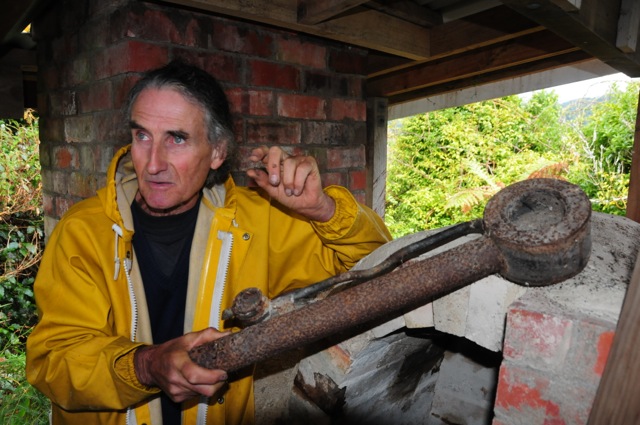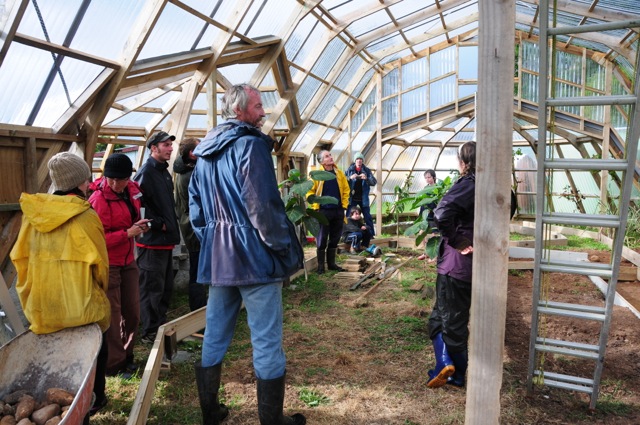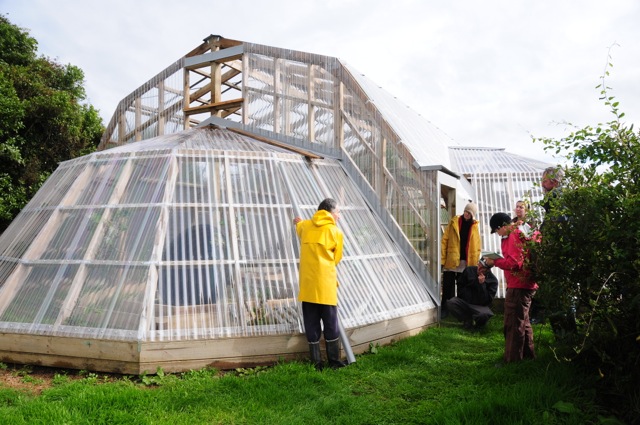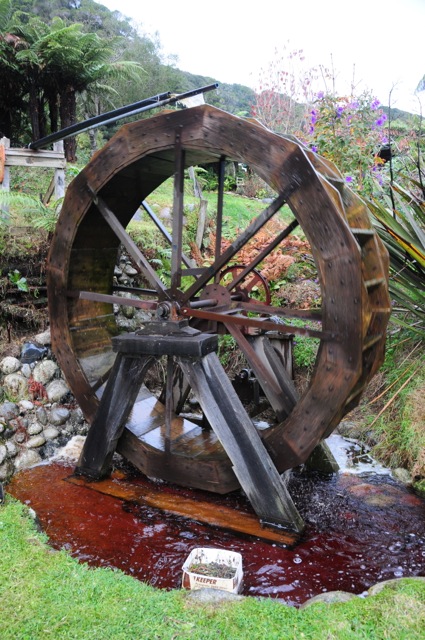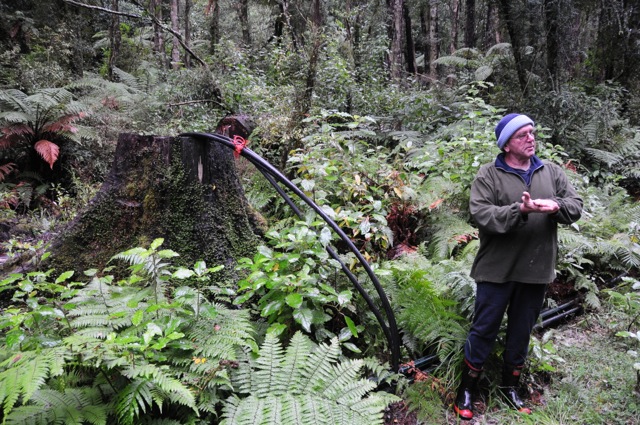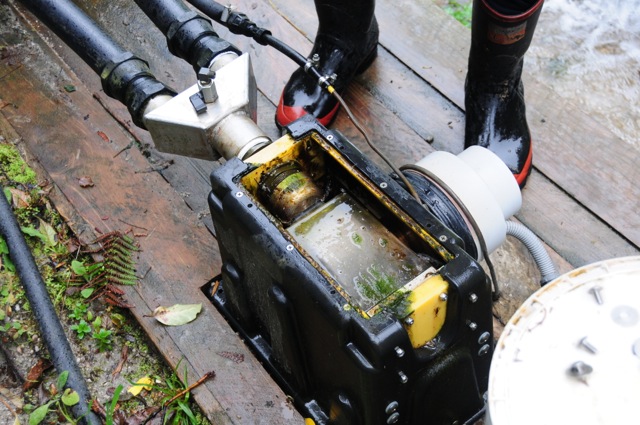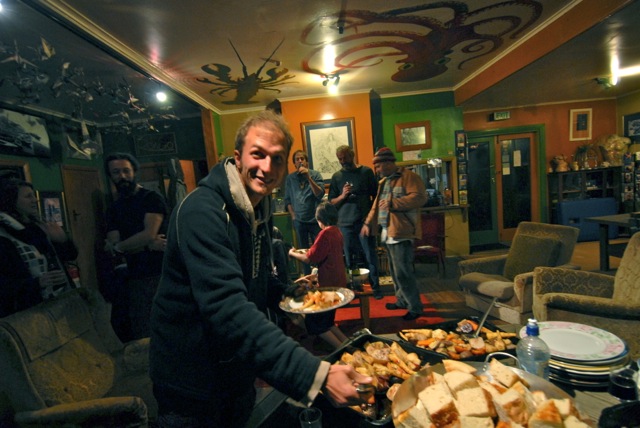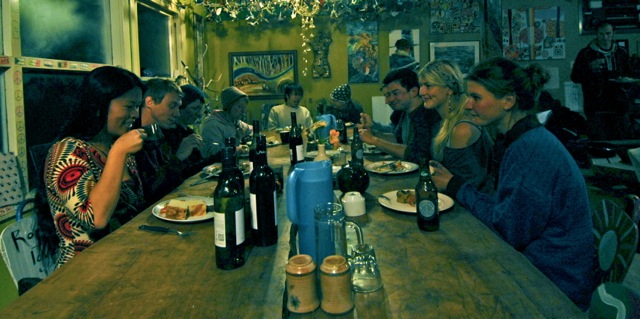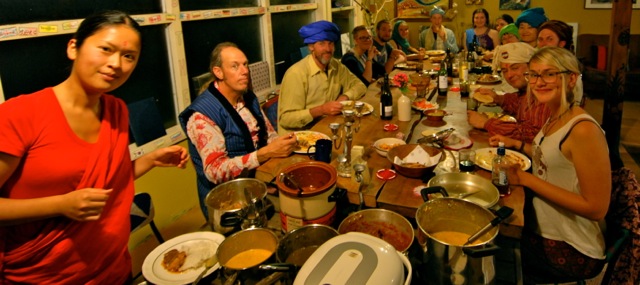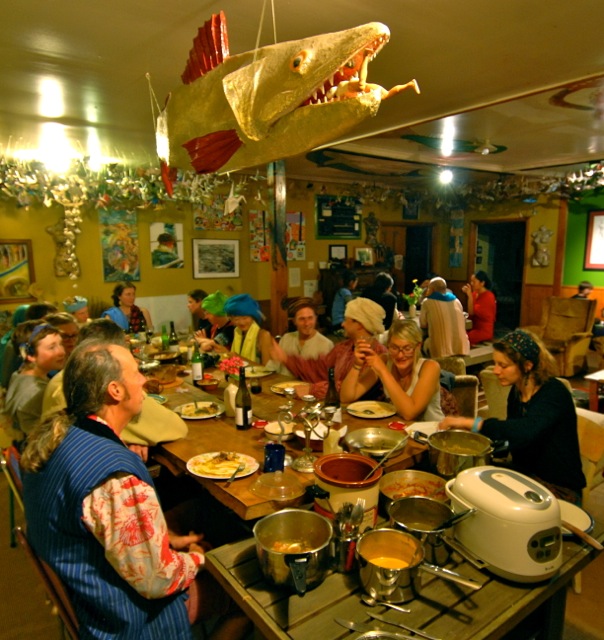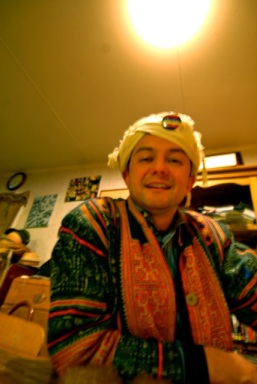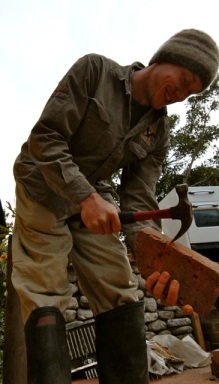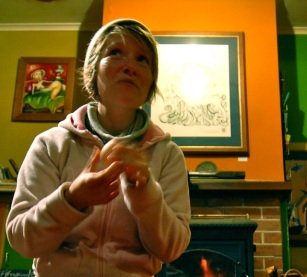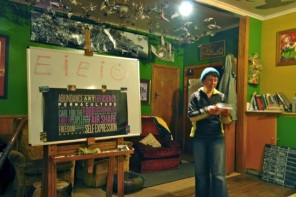Off the Top of My Head
By Paul MurrayStudents from France, New Zealand, Germany, the United States and Japan converged on Karamea on the West Coast of the South Island of New Zealand for the 2013LivinginPeace (LiP) Project Permaculture Design Course (PDC).
The LiP Project combines Permaculture, Travel, Art and Education into a sustainable business and the course provided an excellent example of the synergy between the components of the project and the efficiency and effectiveness of the venture.
The food for the two-week course was grown on the LiP permaculture farm and sourced from other local suppliers, the course provided the education component, the students stayed in Karamea for over a fortnight and were able to experience the region and meet many of the people living there rather than just pass through (they were travellers not tourists) and the whole event occurred in the vibrant art space of Rongo Backpackers & Gallery.
Students arrived on May 12 and stayed at Rongo Backpackers & Gallery and Karamea Farm Baches to begin the course at 9:00 a.m. sharp on May 14. Senior lecturer Tim Barker came down from the North Island where he had been helping establish the Konaga Institute eco-village to lead the course and he was assisted by the LiP Project Farm Manager Dave Tailby and Founder Paul Murray.
The LiP Project PDC delivered the full theoretical content of other PDCs, but had a strong focus on practical application of the knowledge and included numerous demonstrations, excursions to local permaculture operations and several hands-on workshops to enable students to experience first-hand the principles of permaculture and take home the ability to apply the knowledge in their own projects.
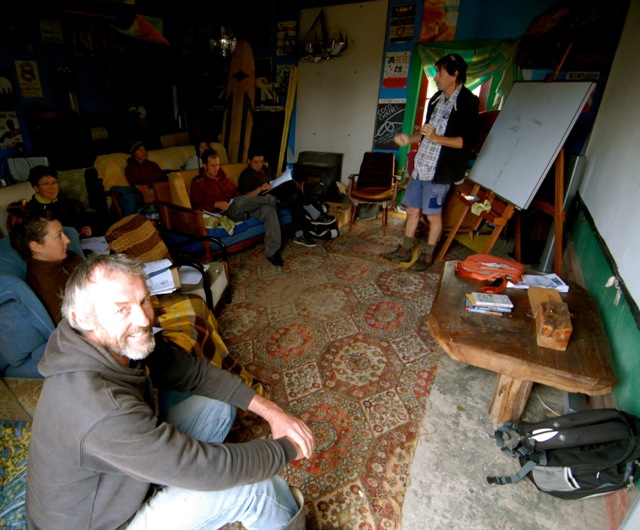
LivinginPeace Project Permaculture Design Course Head Lecturer Tim Barker delivers the theory of permaculture at the LiP Project 2013 PDC.
In addition, the rural location of the LiP Project enabled students to practice designs in real-life situations and create plans for clients in the region rather than merely preparing designs for hypothetical cases.
The 2013 course was the second offered by the LiP Project and plans are afoot to offer two courses in 2014 as the project facilities and services such as accommodation, catering, educational spaces and demonstration sites have proved suitable and popular among those taking the courses and there is significant interest in permaculture worldwide to warrant increasing the frequency of the course.
Appropriate Technology is a speciality of Tim Barker and the LiP Project PDC included practical workshops on rocket-stove construction in which an old electric range was converted into a fully functional, fuel-efficient rocket stove by the students and used to bake (actually “burn” would be a better description) bread the same afternoon…the stove was so efficient and worked so well that the bakers couldn’t believe that so little wood was required to cook the loaf…more practice required!
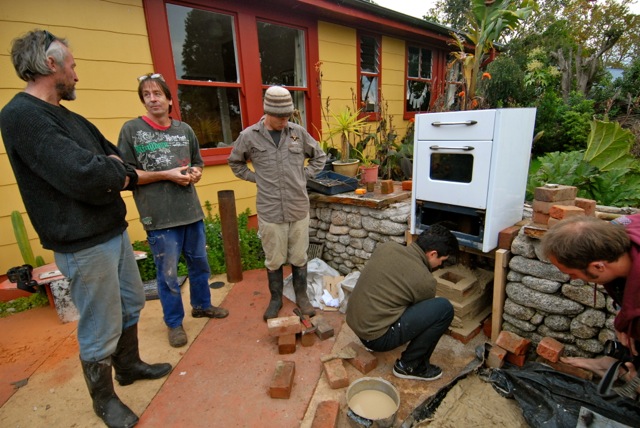
PDC students convert an old electric range into a fuel-efficient rocket stove at Rongo Backpackers & gallery in Karamea.
Dave Tailby is a gardening specialist, he has been growing vegetables organically all his life and at 50 years old has a wealth of experience and knowledge that he enthusiastically passed on to PDC students. Dave conducted several workshops during the PDC including; making and maintaining a 21-day hot compost pile, double-dig and no-dig garden bed preparation as well as numerous tours of the LiP Project Permaculture Farm to show students the food forest, woodlot, garden beds, greenhouse and other features that make up the food-production facility for the project.
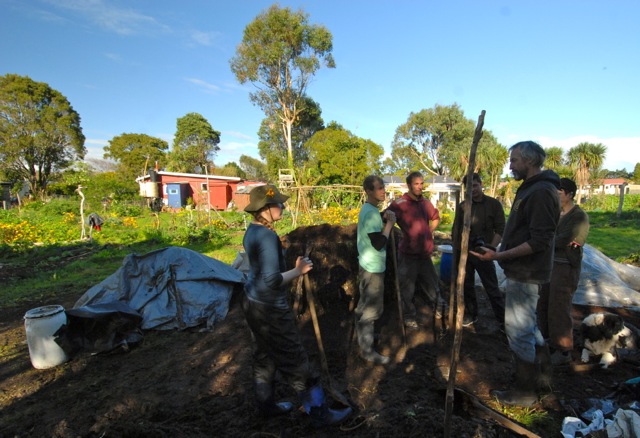
LivinginPeace Project Farm Manager Dave Tailby demonstrates construction of as 21-day hot compost pile.
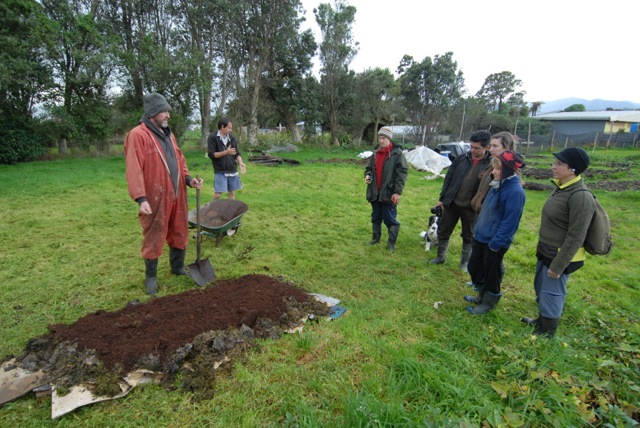
LivinginPeace Project Permaculture Farm Manager Dave Tailby dressed as Sir Edmund Hillary demonstrates no-dig garden bed preparation.
Dave had also worked hard prior to the PDC to ensure that there was plenty of fresh, nutritious, organic and delicious vegetables ready for the students to eat during the course. Food from the farm was turned into beautiful meals by Sanae Murray, who put her Japanese cuisine skills to work in the preparation of the evening meal, and the Rongo Wwoofing crew prepared delicious lunches each day for the hungry students. Permaculture is all about food, so the LiP Project staff worked hard to ensure that the food quality and quantity was sufficient for everyone to concentrate hard on their studies. The communal meals also fostered much vibrant permaculture discussion, political debate, socialisation and hilarity among the PDC students, lecturers, the support crew and the guests staying at Rongo…the atmosphere at Rongo was warm, friendly and filled with laughter.
Excursions to several local permaculture, alternative energy and organic farming projects in the Karamea area were a valuable component of the course and transport was provided to the various locations by Karamea Connections: Movement of the People.
“Permaculture” Peter Curreen’s property was first on the list as Peter has been a permaculturalist for many years and has developed a property in Karamea that is very much a prime example of how permaculture design can enable the provision of sustainable food production, housing, income and security. Peter so inspired the LiP Project PDC students that many of them returned to visit his property again in their own time at the end of the course.
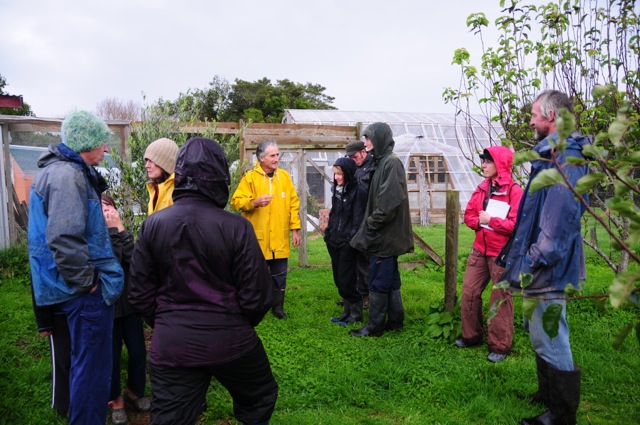
Permaculture Pete takes LivinginPeace Project PDC students on a tour of his permaculture farm.
(Photo by Miguel Varella-Cid)
Hamish and Margaret MacBeth then hosted the students for a tour around their organic farm and tea-tree oil distillery and a discussion of their business, which manufactures and distributes organic tea-tree oil products worldwide. True Blue Organics is the only certified organic tea-tree oil distillery in New Zealand and their products include pure oil, coveted for its antiseptic and curative properties, soap, balm and other personal-care products. Long-term Karamea residents, the MacBeth’s organic farm provides for their food needs and their oil distillery provides income that affords them a high quality of life.
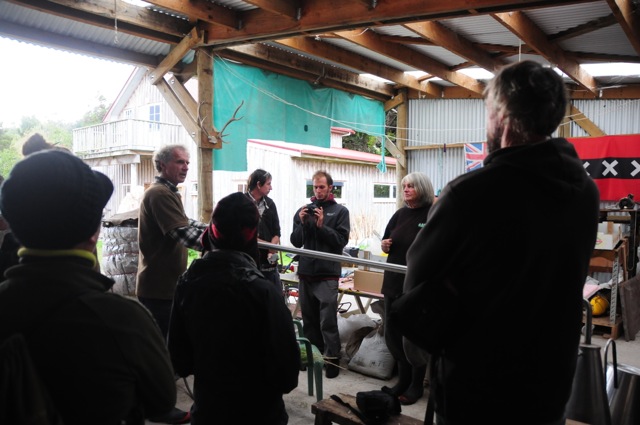
LivinginPeace Project students tour True Blue Organics tea-tree oil distillery owned by Hamish and Margaret MacBeth.
(Photo by Miguel Varella-Cid)
Dave and Lorraine Monteith also hosted the PDC students on their property, which features hydro and solar electricity generators that provide sufficient power for them not to have a monthly power bill, but still enjoy the comforts of modern life. Handyman Dave constructed a wooden water wheel that is fed from a permanent spring that emanates from the hills behind the house. He also made a hydroelectric generator from an old washing machine flywheel that, in conjunction with several photovoltaic panels on the roof of their house, produce sufficient power to run the household and all the modern appliances they need to live comfortably.
Jack Simpson, a Karamea-born and bred diesel engineer, who worked around the world on oil drilling operations before setting back in Karamea, showed the students the hydro-electric power plant he constructed in the fast-flowing Virgin Creek, which flows though his property near Karamea Gorge.
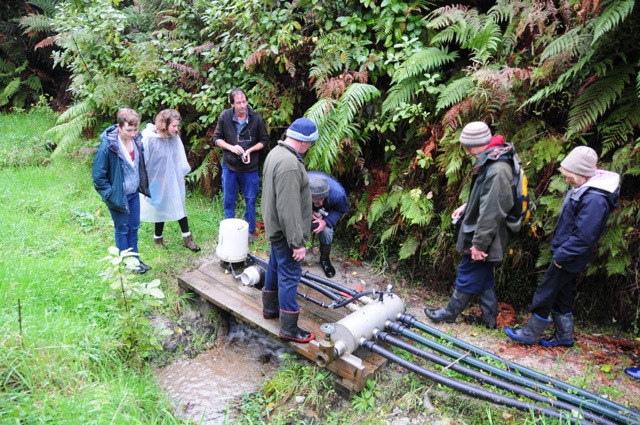
Jack Simpson shows his hydro-power system to LivinginPeace Project permaculture students.
(Photo by Miguel Varella-Cid)
The excursions provided an opportunity for the LiP Project PDC students to see progressive permaculture thinking, energy efficiency and the effective application of the ideas presented in the course in practice. This reinforced the theoretical concepts presented in the course and enabled the students to visualise the application of available technology in real-life situations.
Thanks a lot Jack, Margaret, Hamish, Dave, Lorraine and Pete for taking the time to share your knowledge and show the PDC students your innovative sustainability, energy efficient features on your respective properties. The excursions to your properties was a valuable addition to the course we are very grateful for your time and the efforts you made to share your knowledge and experience with the course participants.
Thank you also to Tim Barker and Dave Tailby your enthusiastic delivery of the course information and for going the extra yards necessary to make the LiP Project PDC such a great success, I look forward to working with you both next year and the years to come.
To the Rongo crew, you were amazing…Regula, Yukiko, Ken, Brian “Big Man” Thomson, Gerar, Nicole, Sam, ViVi, Lenka, Maree, Mitsuyo thank you for re-doubling your efforts in keeping Rongo rocking for the entire course as well as maintaining the hostel, looking after the guests, chopping wood, washing dishes, gardening, laundry, food preparation, cleaning, vacuuming, polishing the silver etc…it was a fabulous team effort and everyone really enjoyed the course, the food, the entertainment and the service you provided…Rongolians Rule!!
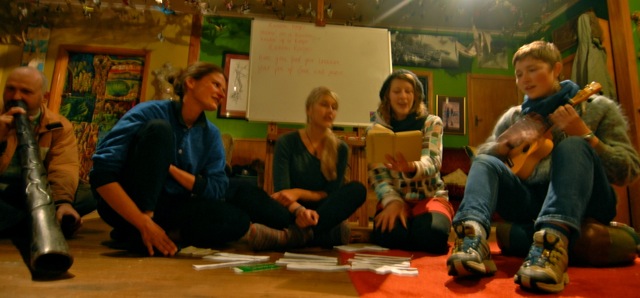
The World Famous Rongolian Singers entertaining PDC students and guests at Rongo Backpackers & Gallery.
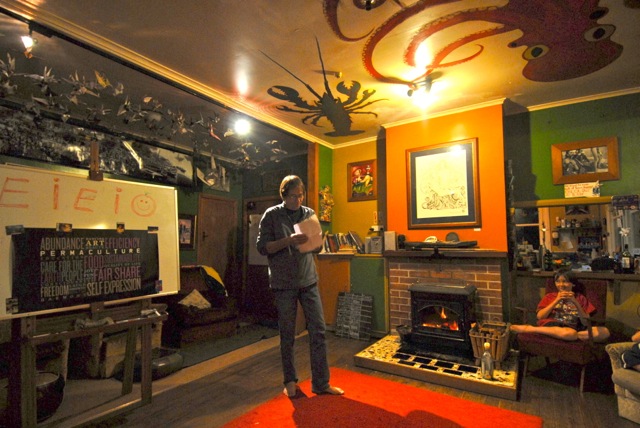
Head Lecturer Tim Barker delivers a rousing valedictory speech at he wrap party to close the 2013 LiP Project PDC and wish the graduates well in their permaculture travels.
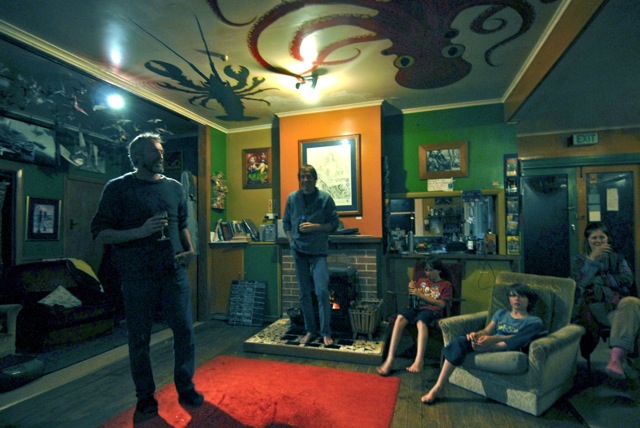
Master of Ceremonies Dave Tailby marshals proceedings masterfully at the 2013 PDC wrap party at Rongo Backpackers & Gallery.
Finally, a BIG thank you to the students, you guys were AWESOME…thank you for coming all the way to Sunny Karamea for the course, for being so enthusiastic and making the course fun as well as educational. I hope you all enjoy your travels in permaculture and the amazing adventure you are about to embark on…turn your faces into the wind, spread your wings and take off into the brave new world of possibility before you.
Testimonials from the 2013 LiP PDC Graduates:
Miguel Varella-Cid:
“About 2 years ago our family had bought an old countryside home with a large piece of mostly forested land in Japan with the intention of making a garden to feed our family in the healthiest ways possible. I bought books, videos and sought advice from friends which has led to a lot of changes, from clearing well over 100 small trees, shrubs & their roots & planting an orchard to making vegetable patches and planting for the first time.
I was finding it difficult to be certain of the directions I was taking, since I’d never grown foods before and I realised that no matter how many books I bought they weren’t going to answer the many questions in my head in the same way a PDC course had the potential to. I wanted to be able to confidently design a permaculture project rather than learning after making all the classic mistakes and worse, as I knew that knowledge would be key to creating the best possible solutions for our home.
So my family & I packed our bags & headed to beautiful Karamea for me to do a PDC! I’d anticipated it might not be as well taught as say one at PRI Australia, but realised within a short time this was in fact a very well put together course of an improved curriculum to PRI’s!
Tim Barker’s enthusiasm and knowledge was evidently contagious and with each passing day I found myself learning a lot & thoroughly enjoying it. Dave Tailby did some excellent practicals & never grew tired of my many questions about their farm project and how to grow foods effectively & completely naturally.
We learnt of things I may never have come across through reading books; from how to make maintenance-free bee hives, to constructing a rocket stove oven from old bricks, clay & a defunct electric stove in which we were cooking bread in less than 2 hours!
Through visits to local permaculture projects in Karamea we got to practically see how a washing machine’s internals could be used to make hydro-electricity to power a home, or even how a composting toilet works with no nasty smells at all! We spent time seeing how to prune & create easily manageable fruit orchards to creating worm farms and 21-day compost heaps. It ALL makes so much more sense now!
During our course, 3 teams each designed a permaculture project and the results proved to me that I now knew all the right questions to ask myself when making an effective & well considered design. I came away confident & fired up just like Paul had said I would and now feel ready to tackle our home design project with a newfound passion.
We returned to Japan to find our garden overgrown with weeds, with a few vegetables hidden in between. What sometimes seemed like a chore before, is much less so now. I can’t wait to get to work outside this coming weekend. I can see now why those who take a PDC tend to go on to create some wonderful permaculture projects.
I would strongly recommend this PDC to anybody interested in creating sustainable natural living for themselves & others.”
Follow progress on Miguel and his Family’s amazing project here:
http://www.eco-kominka.blogspot.jp
Math Monnich:
“The PDC with the Living in Peace project (LiP) has been absolutely fantastic. It has been my very first PDC and I knew a little bit of Permaculture (PC) through lots of books and some hands on experiences before. So I came with high expectations (I guess everybody did) and they have been more then exceeded.
The 3 wonderful tutors delivered a vast amount of knowledge. On field trips we got to see how other people apply PC principles, learned about forest ecology while being amongst it and we also did see the unlimited creativity and ingenuity of people try to live resilient. Also, the practical stuff we have been doing like building a rocket stove and building a 21-day compost pile made sure that our learning experience was very diverse.
The small group size was a real treat for me and it enabled me to ask a lot of questions and I mean a lot of questions, which I am very grateful for.
I can highly recommend the PDC with the LiP, it is a good example of applied PC ethics and principles. Truly authentic.
I thank you for an awesome time and wish you all the best.”
Ramona:
“PDC 2013: The course absolutely exceeded my expectations. From lessons in the cosy classroom with comfortable couches to outdoor hands on on the PDC farm and visits to local examples of permaculture ideas in practice – this course has everything! The teachers, Tim, Dave and Paul do an amazing job. They always had an answer for our questions.
I was provided with so many great but never the less simple ideas, that I know for sure I can do this at home. Rocket stove, solar oven, chicken mandala, composting toilet etc. – i learnt so many things. And if i can’t remember the details i just look into my permaculture folder i got now.
I can’t wait to start my own projects!”
Rongo Backpackers & Gallery: “Rongo has what lots of backpackers all over the world are looking for.
It is that feeling of being welcomed and to be at home. Rongo is open-minded, gives you the possibility to exchange all sorts of ideas and most of all it is a place to make friends. When you have been to Rongo you know how a backpackers should feel like. Welcome home….”
Sharon Gottermeyer:
“Massively awesome course! I learnt heaps over the intensive 2 weeks – not just from the course tutors, but also from my classmates. The tutors sure knew their stuff – they’ve practiced what they teach and their passion for the subject is inspirational.
The course was pretty intensive with classes, field trips, and project work, but there was still room for critical discussions and time for socialising at breaks and meal times. One of the bonuses of this course was having a tutor that had vast experience in appropriate technology – it blew me away learning about making clean drinking water using a biosand filter system, and we actually built an efficient-wood-burning rocket stove.
I really liked the venue – a backpackers that had an eclectic decor and grounds, and run by an amazing bunch of open and friendly people. The venue had its own mini cinema where classes were held during the day, and in the evenings screened biweekly documentaries and movies. Nearby is a wild beach and we got to do a day walk in the local national park.
I recommend the PDC in Karamea – I found it was a awesomely diverse experience of ideas, people and surroundings with lots of fun and laughter in the mix.”
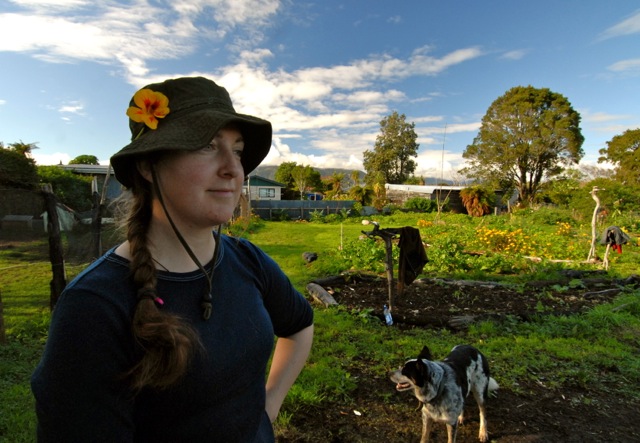
Heather Andrews expressed interest in the LivinginPeace Project Farm Internship and stayed on after the PDC to work with Farm Manager Dave Tailby for a month to apply her permaculture skills. Heather is the first official LiP Project Farm Intern, congratulations Heather!
Heather Andrews:
“I thoroughly enjoyed taking the LivingInPeace Project’s 2013 Permaculture Design Course in Karamea. The teachers (Tim Barker, Dave Tailby, and Paul Murray) were excellent, informative, and experienced while making the information relevant and engaging.
We covered a wide range of topics ranging from gardening techniques to livestock management to home building, and questions were always welcomed and explored with further information happily provided on request.
All three teachers made the whole experience FUN as well, taking us on great local “field trips” to see permaculture concepts in action as well as getting us involved in on-site projects like building a rocket stove. They were also endlessly helpful to us in our individual design projects, always willing to be a resource or point us towards the information we needed, and encouraging us to think creatively, try new things, and follow our individual interests and passions.
I would definitely recommend the course to anyone interested in permaculture, especially those just starting out like me. It was a great foundation course for me, leaving me wanting to learn more and convinced that permaculture is the way of life for me.
The food and accommodations were excellent, as well as the Rongo staff—well above and beyond expectations—and the location is about perfect with beaches, mountains, rivers and wildlife all around.
I enjoyed it all so much, I jumped at the chance to stay on as a short-term intern after the course, which has allowed me to learn more and get hands-on experience of “living permaculture.” Fantastic!
Many thanks to all, this has been an experience I will treasure as well as a lifelong resource and a solid start to my journey toward sustainability.”
Heather Andrews
7 July 2013
LivinginPeace Project Permaculture Farm Internship
“I’ve thoroughly enjoyed my 6 week internship at the LivingInPeace Project on all levels. Working with Dave has been one of the best work experiences I’ve had. He’s a fantastic teacher—a good communicator with heaps of knowledge and experience, a great sense of humour, a willingness to let you learn by doing, and that skill of all skills, the ability to improvise (aka Kiwi Ingenuity). He makes a workday FUN, which is as good as work gets, really!
I got to learn about sheep care, safe chainsaw practices and maintenance, preparing and planting permaculture garden beds, making fast and slow compost, planting support species and young fruit trees, gathering kelp for use in fertilization, harvesting driftwood for firewood, using chickens as orchard conditioners and fertilizers, cobbing a rocket stove using homemade cob, and more.
The cottage accommodation was absolutely lovely—quiet, surrounded by trees, comfortable and cosy. I loved harvesting vegetables and herbs from the garden to eat, and one of my favourite memories will be sharing meals with Dave and staff at Rongo’s. I am endlessly grateful to Dave, Paul, and all the staff at Rongo’s for this fantastic experience, it has been a highlight of my time in New Zealand and one I’ll treasure forever. Thank you, thank you!!!”
Heather Andrews





